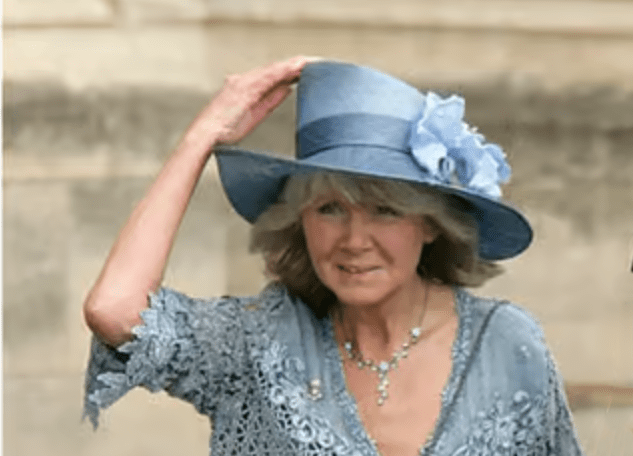Dame Jilly Cooper provided readers with a scandalous yet reassuringly familiar literary haven for decades. With witty banter and flawless pacing, her books—fondly referred to as “bonkbusters”—mapped out romantic and societal mayhem. The hints are glaringly obvious, despite the fact that she never disclosed her wealth in public. Given its vast grounds and timeless elegance, her Gloucestershire home, which she purchased for a mere £145,000 in the 1980s, has probably valued considerably.

Even into the 2020s, Jilly’s brand remained incredibly successful due to the royalties her novels have generated over the past 40 years and the adaptations they have inspired. She met a new generation with the Disney+ series Rivals, which starred Emily Atack and Danny Dyer. Such exposure is a financial engine as well as a cultural endorsement, particularly through international streaming services.
Dame Jilly Cooper – Bio & Career Overview
| Category | Details |
|---|---|
| Full Name | Dame Jilly Cooper, DBE |
| Birthdate | February 21, 1937 |
| Death | January 2025 (aged 88) |
| Birthplace | Hornchurch, Essex, England |
| Residence | Gloucestershire, England |
| Profession | Novelist, Journalist |
| Best Known For | Riders, Rivals, Polo, The Rutshire Chronicles |
| Estimated Net Worth | Not publicly disclosed; likely in multi-million-pound range |
| Marital Status | Married to Leo Cooper (d. 2013) |
| Children | Two adopted children, Felix and Emily |
| Grandchildren | Five: Scarlett, Sienna, Jago, Lysander, Acer |
| Source |
Jilly Cooper created a recognizable realm through clever storytelling: Rutshire, a fictional British countryside rife with politics, lust, gossip, and horses. Real public people were reflected and ridiculed by her characters, who were often polo-playing nobles, intrepid journalists, and alluring politicians. Whether or if characters like Rupert Campbell-Black were based on well-known British aristocrats was a topic of endless speculation among readers. The buzz and, consequently, her sales were only heightened by that conjecture.
Cooper had established herself as a household name by the 1990s. Her publisher had an aggressive release plan, and her novels sold in the millions. Large print runs and elaborate promotional tours were included with every title. It is simple to deduce the financial implications of such continuous success: Cooper probably made millions of dollars during her lifetime, and her estate is currently steadily increasing thanks to streaming royalties and ongoing book sales.
The charm of Dame Jilly went well beyond the page. Her candor, both humorous and painful, struck a chord with many. She talked candidly about her experience with adoption, calling her kids “a wonderful gift.” She said she “can’t bear the thought of children not being loved” in an interview with Community Care, expressing how much she valued stability and love for kids. The emotional strength of her characters—always flawed, frequently chaotic, but never unloved—is explained by that kind of raw emotions, which has been filtered through decades of narrative.
Many people read her books again during the pandemic because they provided a reassuring form of escape. Former Prime Minister Rishi Sunak was one particularly surprising enthusiast, admitting on This Morning that he was a huge fan. He remarked that her writings helped him detach and that “you need to have escapism in your life.” Cooper responded with utter delight, telling The Independent, “I’m absolutely thrilled to bits.” She was obviously touched that someone so involved in everyday politics still had time for her stories of romantic redemption and rural mayhem.
Over the past ten years, her literary legacy has significantly enhanced thanks to savvy alliances with media outlets and publishers. Her estate has proved extremely effective at turning nostalgia into income by updating her writing to suit modern preferences without sacrificing its original humor. Cooper’s voice stayed distinctively alive: witty, perceptive, and emotionally tender. Other literary estates, such as those of Agatha Christie or Daphne du Maurier, have done similarly.
Stability and occasional conflict were provided by her marriage to military publisher Leo Cooper. After more than ten years of suffering with Parkinson’s disease, he passed away in 2013. There was some turmoil in their relationship. When probed about Leo’s previous affair during a famous Woman’s Hour appearance in 2012, Jilly was stunned into silence. She paused for nine seconds before quietly responding, “I don’t want to talk about it.” She subsequently stated in a documentary, “My husband was a lovely man, but he fell in love with someone else,” despite the awkwardness of the situation. And that’s what took place. In the end, the couple got back together—a plot point that is consistent with her own books.
Jilly had a charmingly anecdotal life outside of marriage and books. She acknowledged kissing Sean Connery in her kitchen while married in one interview. She told The Mail on Sunday, “He came in and took me in his arms and kissed me.” Her reputation as a woman who welcomed trouble without remorse was further cemented by the admission, which was made while laughing.
Although her inheritance is not publicly assessed, it probably consists of foreign rights, property holdings, film and TV adaptations, and royalties from over a dozen best-selling books. British writers like Ian McEwan and J.K. Rowling have shown that literary estates can produce remarkably long-lasting yet unexpectedly inexpensive revenue streams for decades. Cooper’s family may benefit from an exceptionally successful legacy if her postmortem earnings continue on the same track.
Following her passing, her children, Felix and Emily, released a statement in which they referred to mom as “the shining light in all of our lives.” Unquestionably personal, their loss also signifies the end of a literary period. However, Jilly Cooper is essentially starting a new chapter in her life. Her commercial and cultural influence is changing as producers look into further adaptations and publishers repackage her books for younger readers.
